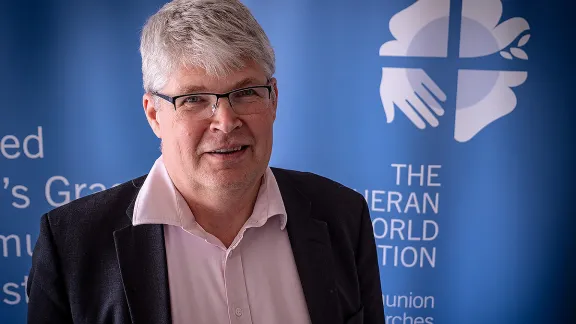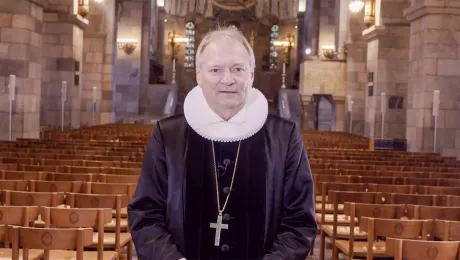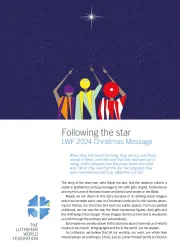
Rev. Rolf Steffansson. Photo: LWF/ S. Gallay
Executive director Rev. Rolf Steffansson talks about the Mission of Felm
(LWI) - The Finnish Evangelical Lutheran Mission (Felm as it is known abroad) will celebrate its 160th anniversary next year. With 100 staff abroad and 100 in Finland, FELM works in 30 countries worldwide. LWI talked with Executive Director Rev Rolf Steffansson about FELM’s understanding of mission, relationships between north and south, and the challenges of doing mission today.
Lutheran World Information (LWI): Can you tell us about Felm’s work and your understanding of mission?
Rev. Steffansson (RS): Our understanding about mission is a holistic one, it is very close to the Lutheran World Federation (LWF). We see that mission encompasses proclamation and diaconia, which also means development cooperation and advocacy; and we define our work in four themes of hope:
As a mission organization, we firstly see it as very important to encourage the churches to be churches for others. We talk about inclusive churches that make space for people who have been marginalized or pushed out of society. This is so that both their language and activities are formed to meet the needs of these marginalized people, and also offering the chance to the marginalized to be subjects in the churches.
The second theme is human rights and human dignity. We work with girls and women, people with disabilities, youth and children in vulnerable positions, and ethnic and language minorities.
The third theme is advocacy work, where we focus on social and economic justice. We want to talk about the sharing of the resources of the world, and we also do advocacy for just peace, because the fourth theme of hope is peace and reconciliation. We work on developing peace dialogues and psycho-social support for victims of conflicts.
Faith at work
How does this understanding of mission differ from the traditional image of going to a foreign country and converting people to Christianity?
I would say that it differs a lot because in the way we talk about it we do holistic mission. I was working in Tanzania myself and people in my congregation were very strict about the fact that you cannot preach to a person who is hungry. If we think that the mission will only be the preaching part, we are badly wrong. How can people learn to know God’s love if you only talk about it? We need to put it into practice and to see where the points in people’s lives are that need a touch of the love of God.
If we think that the mission will only be the preaching part, we are badly wrong. How can people learn to know God’s love if you only talk about it? We need to put it into practice and to see where the points in people’s lives are that need a touch of the love of God.
As Lutherans we are also very careful to say how faith is not our work, but it is the work of God in people’s hearts. Our work is to live what we believe. We want to be transformed ourselves by the Gospel and then live it out, so it transforms the societies we are working with.
What are the main challenges in the countries you work in?
The main challenge is the growing despair and a growing feeling of hopelessness. I look at climate change which is threatening the livelihoods of people. On the one hand, we have fewer and fewer resources in many countries, and we have a growing population that needs to use these resources. I see the conflicts and the refugee situation stemming from these things, as the result of human greed. It also creates a growing young population in danger of being radicalized, because people use religion irresponsibly.
Strengthen the dialogue
How do you build bridges between north and south?
Felm has regular contact with all the congregations in Finland. Our strategy is to inform about the situation and the church life in the countries we work in to try to build contacts between north and south. I think now with social media growth and with the increased possibilities to travel, there are more chances to meet, to have deeper dialogues between north and south, and to get to know one another.
In the Finnish setting, in Felm we have been the first to give information about Africa and the global south to the Finnish public. So much of what the older generation and the Finnish public know has been the result of Felm workers visiting congregations.
What is the value of your partnership with the LWF?
We are very close in our strategic aims. We see the value of the LWF as a communion where churches come together, many of which are our partners. The discussions in the LWF inform our discussions and how we are to approach our objectives.
There are things that are best handled together, like good theological education; an organization like Felm cannot do that alone. We need the communion of churches to do it with.
Mission in the LWF Communion
“Go therefore and make disciples of all nations, baptizing them in the name of the Father and of the Son and of the Holy Spirit…” (Matt. 28, 19) is the biblical commission to share the gospel with people all over the world. The understanding of that commission has changed over time, and is perceived differently in different regions. In a series of interviews and articles, Lutheran World Information explores the understanding of mission in the different LWF regions and member churches.


